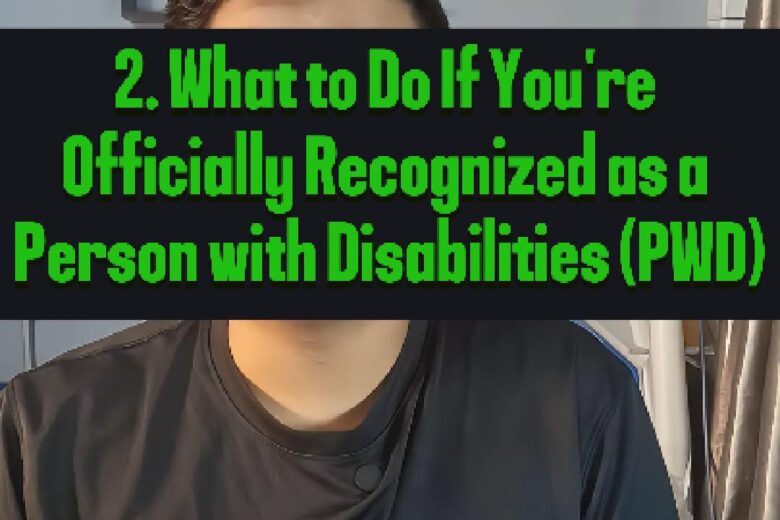Life can change in an instant. If you or a loved one has recently been officially recognized as a person with disabilities (PWD), it’s important not to panic. There are clear steps you can take to ensure that rights, benefits, and support systems are properly accessed. This guide will walk you through the essential actions to take in this situation.

Registering as a Person with Disabilities
The first and most crucial step is to register with the Department of Social Welfare. Registration allows access to various benefits, financial aid, and support programs that can significantly improve quality of life.
How to Register
- Visit the nearest **Department of Social Welfare** office and request a PWD registration form.
- The staff is usually helpful, so don’t hesitate to ask for assistance.
- Take the form to a doctor who has been treating you. If you have a specific medical condition such as a stroke or physical disability, your doctor will need to provide verification.
- Once completed, submit the form back to the Social Welfare office.
- Keep a copy of your registration document for future reference.
- Ensure you are aware of any follow-up steps or renewals required for continued assistance.
Benefits of Registering as a PWD
Once registered, individuals with disabilities can enjoy numerous benefits provided by the government and non-governmental organizations.
Key Benefits Include:
- Financial assistance for medical expenses and daily needs.
- Healthcare and rehabilitation programs.
- Discounted public transportation fares.
- Employment and vocational training opportunities.
- Access to specialized mobility aids and assistive technologies.
- Housing assistance and modifications to accommodate disabilities.
It’s important to check the eligibility criteria for these benefits to ensure you receive the appropriate assistance.
Seeking Support and Community Assistance
After registration, finding support is the next step. Various community organizations and NGOs provide assistance tailored for Person with Disabilities and their families.
Organizations That Offer Assistance
- Department of Social Welfare – provides official aid and support programs.
- Rehabilitation Centers – offer therapy, skill training, and mobility support.
- Non-Governmental Organizations (NGOs) – provide financial aid and community integration programs.
- Peer support groups that help individuals with disabilities connect with others in similar situations.
- Online platforms that provide information and virtual support communities.
Emotional and psychological support is also crucial. Many support groups exist where individuals with disabilities can share experiences and gain motivation from one another.
Government Incentives for PWDs
The government has introduced multiple incentives to assist Person with Disabilities in leading a more comfortable life.
Common Incentives Include:
- Employment support and tax incentives for companies hiring PWDs.
- Special allowances for caregivers of PWDs.
- Utility bill discounts for households with PWD members.
- Educational support grants and specialized learning programs.
- Subsidies for adaptive equipment and home modifications.
- Priority access to certain public services and facilities.
These incentives aim to provide better opportunities for PWDs to integrate into society and live independently.
Planning for the Future
Aside from immediate support, planning for the long-term well-being of a PWD is essential. This includes financial planning, health care, and mental wellness strategies.
Long-Term Considerations
- Creating a financial plan for medical and daily expenses.
- Securing health insurance tailored for PWD needs.
- Modifying the home environment to be more accessible.
- Participating in rehabilitation programs and continuous skill-building activities.
- Ensuring strong social and emotional support networks.
- Exploring career development opportunities for independence.
- Joining advocacy programs to raise awareness about disability rights.
- Seeking legal advice for long-term disability planning and rights protection.
- Enrolling in education programs that support lifelong learning for PWDs.
Taking proactive steps in planning ensures that individuals with disabilities can live more comfortably and independently.
Keep Your Home Safe and Hygienic
While ensuring the well-being of family members, maintaining a clean and pest-free home is also crucial. If you struggle with ants and roaches, consider checking out RoachAnt, an effective solution for keeping your home free from pests.
By staying informed, seeking support, and planning ahead, individuals with disabilities can lead fulfilling lives with dignity and confidence.
Tiktok: https://www.tiktok.com/@naszshaie?_t=ZS-8tWm4jvv4O0&_r=1
Whatsapp: https://wa.link/ywig5s
Instagram: https://www.instagram.com/naszshaie?igsh=MWJ2MnF1N3cyejJsMQ==



